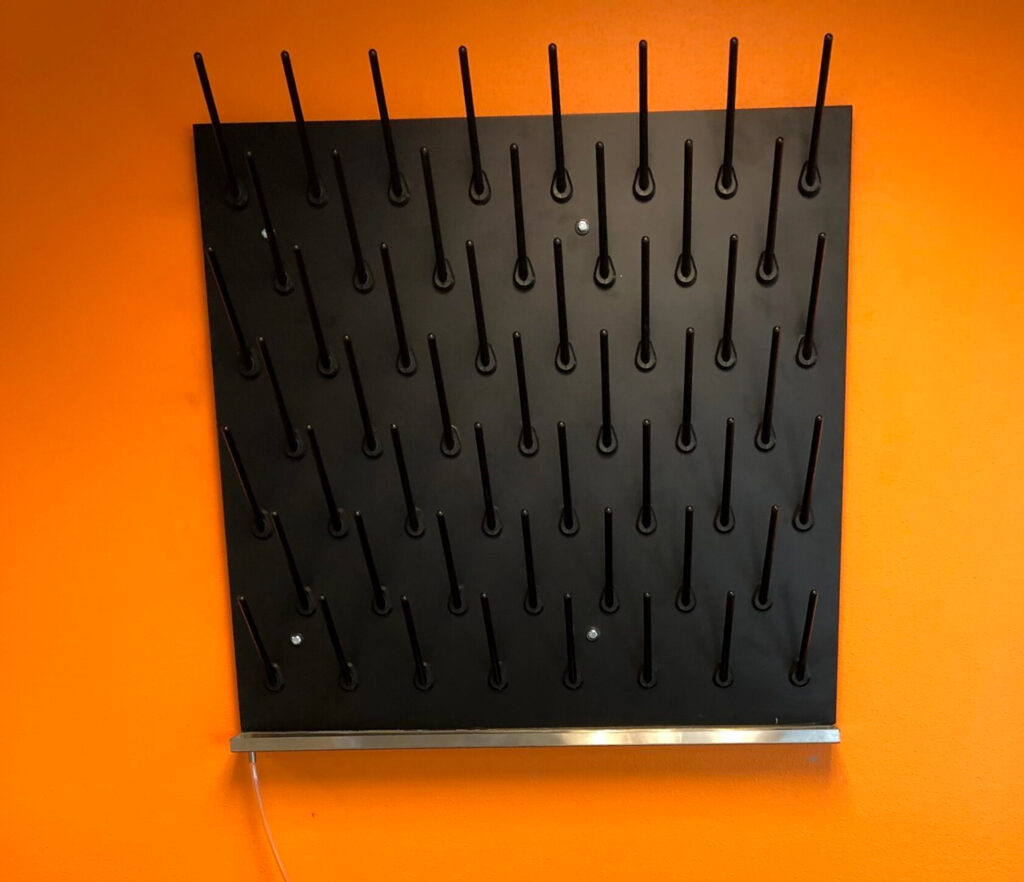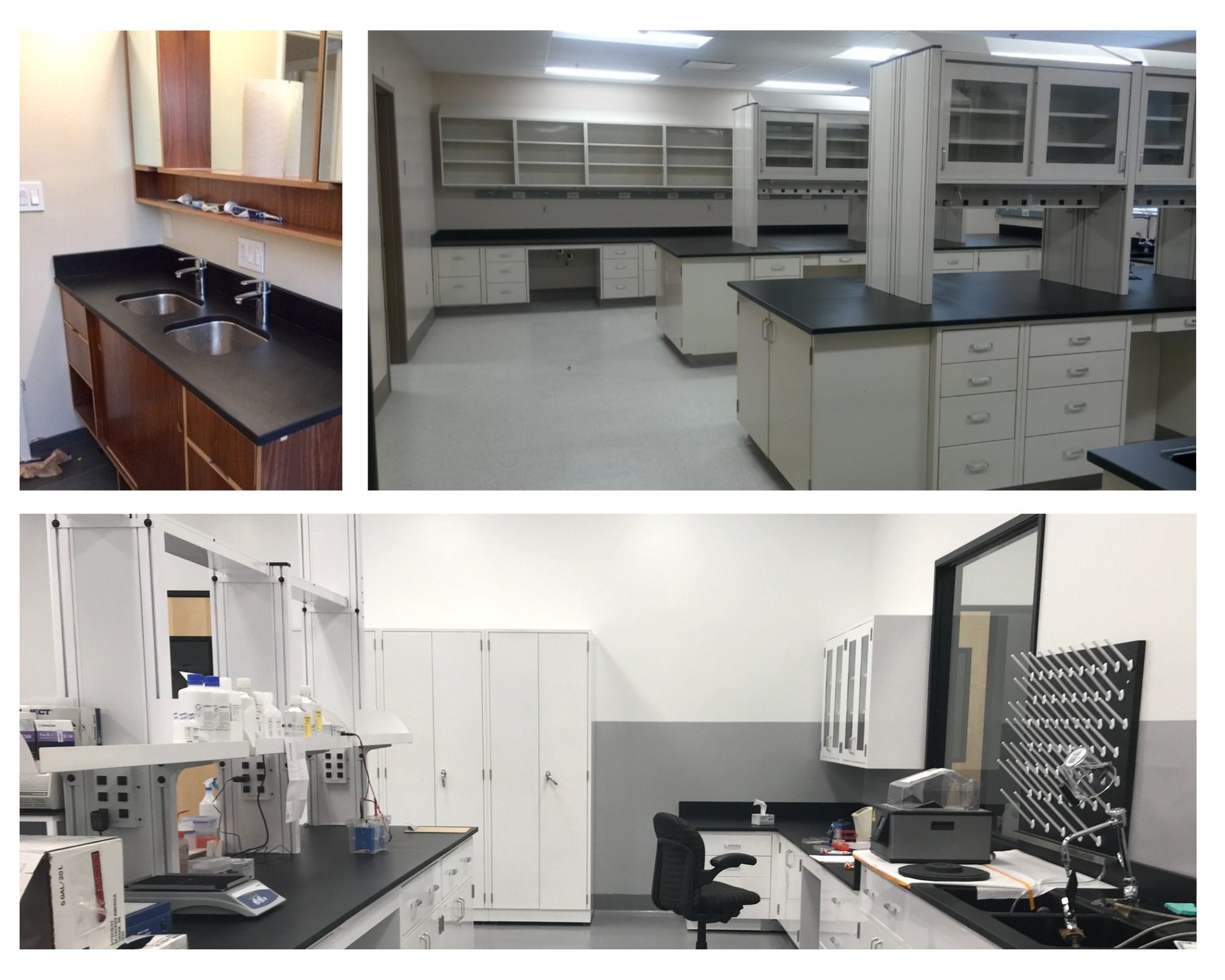Laboratories are a special environment where experiments involving flame, harsh chemicals, bacteria, and other substances take place. This is why having durable equipment is necessary, like phenolic and epoxy resin pegboards that are made of thermoset plastic that can withstand high temperatures, chemicals, and water.
In addition, laboratory work surfaces have to be made of materials that are chemical, heat, and water resistant. The most popular options for laboratory counters are epoxy and phenolic resin.
Epoxy is made from a combination of epoxy resin, hardeners, and silica. While phenolic resin, on the other hand, is made from resin wrapped in chemical-resistant films, overlay papers, or kraft papers. The former is more resistant to heat, and the latter is a more affordable alternative.
Whether you choose to go with epoxy or phenolic resin, it’s important to match your countertop with the right pegboard to properly organize your laboratory. Below, we’ll describe the four types of pegboards commonly available in stores to help you select the best one that would go along with your chosen countertop in your laboratory.
1. Plastic or Acrylic Pegboards
The most readily available pegboards on the market are made from plastic and acrylic. Plastics have a simple manufacturing process, hence they are cheaper to produce, moisture resistant, and lightweight. Because of this, plastic pegboards are a top choice for those looking for cost-effective pegboards that are easy to clean.
Because the said material neither peels nor breaks, plastic pegboards are usually used in clean rooms and factory floors. These types of pegboards also come in various sizes, making them largely customizable. Additionally, they usually come ready to mount, making them a top choice for DIY-ers decorating offices and workshops.
Plastics are also relatively durable; they can support heavy tools and equipment like electric drills and hammers easily. Not to mention, plastic pegboards are available in recycled and reprocessed plastic, making them a more eco-friendly option.
2. Hardboard Pegboards
The second most common type of pegboard is hardboard pegboard. A hardboard is a high-density fiberboard made from a mixture of small wood fibers and wood pulp that are densely molded. They are lighter, more readily available, and more affordable than wood. Moreover, the standard 1/4-inch thick hardboard pegboards can support toys, fixtures, and light tools easily enough.
Though not as durable as solid wood, hardwood pegboards are a popular choice due to their appearance; those who do not like seeing plastic hanging on a wall tend to reach for hardboards for their aesthetic. Like plastic pegboards, they are a common choice for decorating workshops and storage areas. Some even use them as a finishing treatment akin to the paneling.
However, unlike plastic pegboards, they don’t come ready to mount and will require fur strips; this may limit the number of holes you can utilize. Another thing to keep in mind is that hardboard pegboards are not resistant to heat or water, making them indoor-only options.
3. Metal Pegboards
A less common pegboard type is metal pegboard. Made of galvanized sheet metal or steel, metal pegboards are heavy-duty or double-strength pegboards that come in panels fitted into metal frames.
Because of their immense durability, metal pegboards are considered several times stronger than wooden pegboards and are also more expensive than wood, plastic, or hardboard. They are the best choice for supporting heavy equipment such as machines or large furniture.
Additionally, the metal pegboards on the market can be plain, powder-coated, painted in various colors, stainless, or adorned with different kinds of slots, making them both an aesthetic and versatile option despite their heavy weight. And thanks to their coating, metal pegboards can endure being cleaned using a wet rag without rusting.
Unlike other types of pegboards, these metal panels can be mounted flushed to walls or mounted onto walls along their edges, making it possible to flip them like you would the pages of a book. This feature makes it possible to hold twice as many hooks.
Just take note that while putting excess weight on the hooks won’t damage the pegboard itself, the pressure can damage the mounting points. Lastly, because metal is a conductive material, the use of metal pegboards is ill-advised for construction sites or unfinished garages exposed to live wire.
4. Wooded Pegboards
The least common of all types of pegboards are wooded pegboards. These pegboards are made of solid wood. Hence, they do not possess resistance to heat, water, chemicals, or scratches. As such, they are typically avoided in tough environments and only used in dry places indoors.
The reason wooden pegboards are more difficult to find is that they’re expensive and mostly used for decoration. Wood looks more chic and sophisticated, hence, people who source wooden pegboards typically use them inside their homes for decorative and organizational purposes.
Though wooden pegboards may look similar to hardwood pegboards, their difference lies in them being heavier, sturdier, and also pricier.
Choosing the Right Pegboard for Your Laboratory
The type of pegboard used in labs ought to be safe for laboratory environments. Though not exposed to heat and chemicals as much as countertops, pegboards should still possess the same features, providing the same resistance to heat exposure, moisture, and chemicals for the best safety.
As such, laboratory pegboards should be heat-resistant, non-porous, stain-resistant, easy to clean, can endure spills from chemical products, and resistant to stains.
Having said that, the types of pegboards that are safe for laboratory use are plastic pegboards and metal pegboards. Both have moisture resistance, can withstand high temperatures, and endure chemical spills. Though metal pegboards may rust, stainless steel options will not and are considered safe to use in lab environments.
Match Your Laboratory Pegboard to Your Countertop
Pick out your preferred plastic or metal pegboard, and match it with the best laboratory countertops for the best price!
We’ve been providing customers with lab-grade furnishings, including epoxy resin pegboards and phenolic resin countertops. You can visit our site to check out a wide variety of lab-grade products in our catalog.
To request a free quote, you can fill out our online form with your information or contact us at 800-476-5228 at ResinTops.net today!


